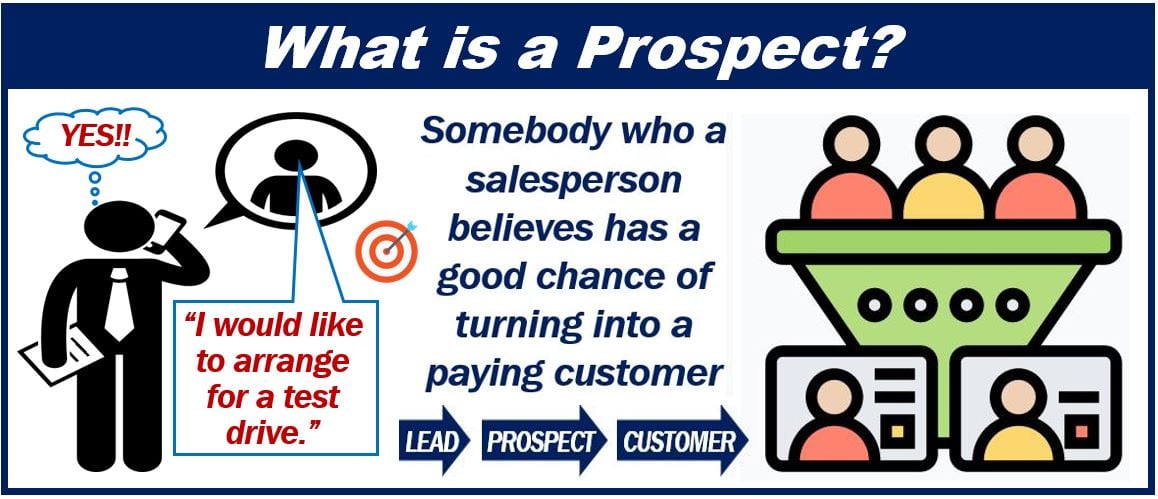We can use the word prospect as either a verb or a noun. It has several meanings. In most cases, the term is associated with something positive that we expect to happen in the near-, medium-, or long-term future.
Prospect – verb or noun
Noun
1. A prospect may be the likelihood or possibility of something occurring in the future, as in: “The prospect of becoming friends again gives me hope.”
2. A consumer who I think could well become a paying customer is a prospect. Some people (not all) use the term hot lead with the same meaning.
3. A candidate for a job is a prospect. If I say: “I’ll be interviewing two more prospects on Friday for the position,” I mean two more job applicants or candidates.
4. The term may also refer to the likelihood of medium- or long-term success, as in: “That job has excellent career prospects.” It means that the possibility of promotion and nice things happening over the long-term are good.
Verb

1. During the California Gold Rush from 1848 to 1855, many people were prospecting. In this context, the term means searching for gold. A mining company may be prospecting for silver, bauxite, or any mineral.
2. In business, prospecting means looking for leads and then trying to turn them into likely customers, i.e., prospects.
Sales and marketing

A person or company that fits certain criteria that a business has outlined based on its product offering is a prospect.
Imagine you sell racing bicycles. A young man calls you saying that he is professional cyclist who makes a living wining prizes. He would like to try some of your bikes. You arrange an appointment for 2pm tomorrow. In your notes, you will definitely describe him as a prospect.
Must a prospect express interest in buying?
Some sales managers say that the person must have indicated in some way that they were interested in possibly making a purchase. Otherwise, they are simply hot leads, but not prospects. Other say that as long as they meet certain criteria, expressing an interest to buy is not necessary.
Prospect vs. lead
Some people use the two terms interchangeably. They shouldn’t, because their meanings are different. The main difference between the two is the level of engagement and the direction of the communication flow.
Leads
With leads, communication goes in one direction; from the seller to the target consumer.
Prospect
In this case, there is two-way communication.
I might send thousands of emails to a target audience in the hope of getting some leads. Some of them respond with their names, and other details I requested in the email. They are now not just names in a list. They are leads.
As soon as I start communicating with these leads and they answer back, perhaps asking for details about the product or service, they have become prospects. Our communication is now two-way – from me to them and from them to me.
Companies’ usage of the terms vary
These definitions are not set in stone. One company may have several types of leads, such as cold leads, warm leads, hot leads, and then prospects. Others may have fewer categories.
A salesperson’s conversion rate will be much better when dealing with a prospect than a lead. Conversion rate, in this context, means sales per presentations/conversations. If I present to 100 leads and make 10 sales, my conversion rate is 1-in-10 or 10%. My conversion rate with prospects will be higher; it might be 25%, 30%, or even higher.
